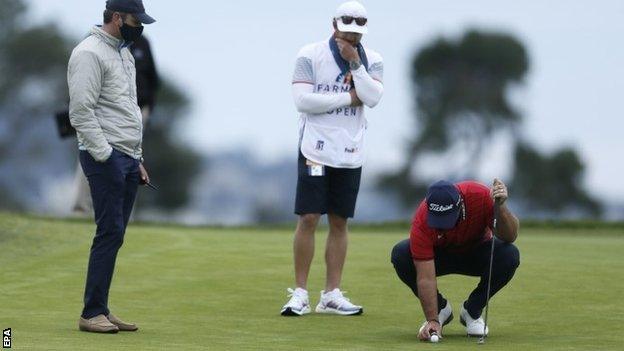Patrick Reed scrutinised more than Rory McIlroy over drop because of reputation
- Published
- comments

Patrick Reed replaced his ball under the watchful guidance of a rules official during Sunday's final round
Patrick Reed is celebrating the most commanding win of his career but few observers view this superb victory, achieved on a tough US Open course, in such glowing terms.
It does not matter how well a remodelled swing stands up while closing out a top triumph on the PGA Tour if there are question marks over the player's integrity, even when the golfer followed the rules to the letter.
Indeed, in the third-round incident that has become the latest controversy to blight Reed's chequered career, he followed similar protocols as the untainted Rory McIlroy did in a separate occurrence in the same round.
But Reed is at the centre of another rules rumpus and the chat in the locker room "isn't great" according to one of his leading competitors. At the same time, no-one is calling McIlroy's character into question.
This is because reputation does matter.
Reed has previous, while McIlroy is remembered for his sense of fair play. A prime example came when the Northern Irishman gave himself a worse lie than he needed to while replacing his ball during last year's US PGA at Harding Park.
"I've never tried to get away with anything out here," McIlroy said after finishing tied 16th, eight shots behind the American winner on Sunday.
"In golf you'd rather be on the wrong side of the rules than the right side of them because that's just what our game's about. Our game is about integrity and it's about doing the right thing."
Reed, meanwhile, is viewed in the way a wary shopkeeper regards a posse of school kids approaching the pic-n-mix counter. His every move is scrutinised.
This is the prism in which Saturday's incident in the greenside rough of the 10th hole of Torrey Pines' South Course has to be viewed, even though Reed acted entirely within the rules.
He marked and picked up his ball, which he believed was embedded in the ground and therefore entitled him to a free drop. He, like McIlroy, could not see that his ball had actually bounced into its final resting position.
"No, I didn't see it bounce," answered a ball spotter as Reed approached her. According to rule 16.3, "your ball is embedded only if it is in its own pitch-mark made as a result of your previous stroke and part of your ball is below the ground".
The PGA Tour tweeted the entire incident, external and subsequently did the same with McIlroy's,, external which occurred on the 18th hole. There was only one difference, McIlroy did not call over an official to inspect the indentation, while Reed did.
Under the rules, which were updated in 2019, players are expected to "make a reasonable judgement" when taking relief, which Reed can argue he did. Yet he still finds himself in the dock of golf's court of judgement.
"It's guilt by association," a leading referee told me. "The new rules allow you to do this without even notifying your partners, which he did (as did McIlroy), so he did more than he had to.
"I said when this rule change came out, it would bite us and here we are."
The "reasonable judgement" element gives scope for different interpretations, which contributes greatly to the furore that followed Reed's drop which led to a successful up and down to save par.
"I would not create a situation like that," said Xander Schauffele, who believes the PGA Tour is protecting Reed. "If my ball's embedded, I usually will wait and call someone and kind of wait until everyone's on the same page."
Schauffele, who finished in a tie for second, five shots behind, added: "He did everything by the book according to the official and everyone stood there.
"The talk amongst the boys isn't great, I guess, but he's protected by the Tour and that's all that matters, I guess."
It is a withering assessment from a potential Ryder Cup team-mate of the man they call "Captain America".
"I texted or talked to 15 to 20 current or past tour players, some of them hall of fame members," pundit Brandel Chamblee told the Golf Channel.
"Not a single player was in defence of what Patrick Reed did. This is in direct conflict with what PGA Tour and USGA rules officials are saying."
Reed is golf's modern day villain and incidents such as the two-shot penalty he received for improving his lie at the 2019 Hero Challenge are not forgotten.
There have been other instances which mean his wins, including victory in the 2018 Masters and last year's World Golf Championships event in Mexico, are not celebrated as widely as they are for other players.
More than any other top golfer, Reed needs to be seen to be playing by the rules and, over and above that, in the spirit of those rules and this is where this incident is most troublesome.
The cameras were on him because he was leading the tournament and he was inspecting a lie that only he could see.
When he picked up his ball he held it in the palm of his hand, not by finger and thumb to ensure everyone could see that he was not attempting to clean it. He followed the rulebook but not best practice.
That is not wise for a man with the reputation he has acquired.
There was not an ounce of regret when he was later informed that his ball had in fact bounced rather than embedding directly when it landed. Reed acknowledged it could not have lodged in its own pitch-mark in that scenario.
For him, it was enough that he had followed the rules. "All I can really do is focus on today," he said after lifting the trophy.
"And just listen to what the rules officials said and they said that I didn't do anything incorrect." In golf, unlike many other sports, that threshold is simply not high enough.
Reed played brilliantly to beat a top field by five shots. He should be lauded for the threat he promises to be in the majors, Olympics and Ryder Cup this year but the narrative is unsurprisingly elsewhere.
No one wants to be asked whether they cheated en route to victory. That's what happened to Reed on Sunday night even though he broke no rules.
It is because he plays a game that demands doing more than just following the rule book, a lesson it seems the 30-year-old Texan has yet to fully learn.

Was Henry VIII who we think?: The Evil Genius team are back to cast judgement
Jacob Hawley On Love: Is regulation and profiteering in the sex industry up for debate?

